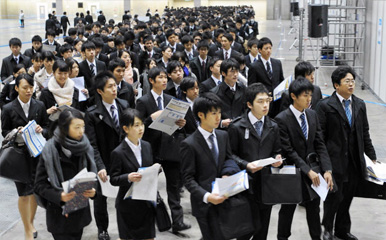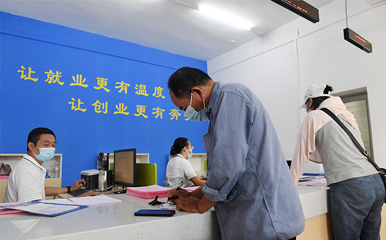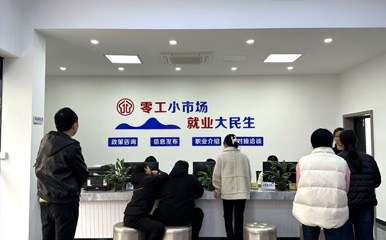In the 2024 government work report, the first government task is to "vigorously promote the construction of a modern industrial system and accelerate the development of new quality productivity." Recently, the management consulting company under China International Technology Intelligence Cooperation Group Co., Ltd. released the "Key Indicators Research Report on the Human Resources Market for 2023-2024" (hereinafter referred to as the "Research Report"), focusing on the recruitment needs of Chinese enterprises in 2024 and the impact of new quality productivity on employment trends.
The "Research Report" aims to assist the human resources service industry and enterprise managers in grasping the trends of the talent market and understanding the latest data information. The research report is based on a sample of nearly 3500 enterprises, covering first tier, new first tier, and second - and third tier cities across the country, as well as state-owned, private, and foreign-funded enterprises, covering industries such as manufacturing, high-tech, sales and trade/consumer goods, energy and chemical, automotive, pharmaceutical and health, finance, construction and real estate, transportation/logistics, etc. The research report points out that the number of employees in most enterprises will remain stable in 2024, with nearly 40% of enterprises stating that the number of employees in 2024 will be basically the same as last year, 28% of enterprises will increase their number of employees, and nearly 30% of enterprises will decrease their number of employees. Faced with uncertain external environments and business challenges, enterprises tend to adopt a cautious attitude towards employee staffing, and are more inclined to promote business development through optimizing organizational structure and improving human efficiency.
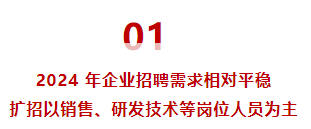
In 2024, 90% of companies have a demand for social recruitment, with nearly half of companies stating that the number of social recruitment is basically the same as in previous years, and 20% of companies indicating an increase in the number of social recruitment.
From the specific recruitment needs, the expansion of enrollment will mainly focus on personnel in sales, research and development technology and other positions. Salespeople play an important role in enterprises, directly affecting the achievement of performance goals. At the same time, R&D technicians play a crucial role in the core competitiveness and future development of enterprises. With technological upgrades and changes in market demand, enterprises need to constantly innovate. Therefore, expanding the number of R&D technicians is a measure for enterprises to enhance their technological innovation capabilities and promote their sustainable development.

In 2024, although enterprises are cautious about staffing, especially the employment absorption capacity of traditional industries, the development of strategic emerging industries such as new energy and new materials, advanced manufacturing, electronic information, medicine and health, as well as new quality productivity related industries such as technological innovation and digital economy, has generated new employment opportunities and talent demand, which will continue to be an effective support for employment absorption in the future.
Strategic emerging industries are the main carriers of new quality productivity, characterized by active innovation, technology intensity, high-end value, and broad prospects. For example, with the increasing demand for sustainable development and clean energy in the market, fields such as new energy vehicles, lithium batteries, and photovoltaics have developed rapidly, which has also led to a shortage of talent supply for popular positions such as electronic control systems, vehicle networking systems, and battery research and development.
The rapid development of fields such as artificial intelligence, chips, satellite communication, biotechnology, and high-end equipment has caused a significant talent gap. For example, the breakthrough in generative artificial intelligence has caused a talent gap in large-scale modeling. The development of high-end chips has increased the demand for advanced process research and development, process and equipment talents in enterprises. Enterprises need composite talents who understand professional technology and have innovative capabilities to promote technological innovation and upgrading development.
In addition, the transformation and upgrading of traditional industries have also increased the demand for digital talents in enterprises. For example, industries such as sales trade/consumer goods, energy and chemical, transportation/logistics, etc. have set up positions in digital operations, data analysis, system architects, and the Internet of Things. Talents with relevant skills can more efficiently conduct data analysis and mining, build intelligent systems, develop digital products and services, and assist enterprises in digital transformation and innovative development. Their career prospects are relatively broad.
With the increasing demand for advanced technical talents in emerging fields by enterprises, the salary levels of such talents have also skyrocketed. Research shows that the median annual salary for senior artificial intelligence engineers is close to 700000 yuan, the median annual salary for digital marketing managers is close to 400000 yuan, and the median annual salary for intelligent manufacturing engineers is close to 300000 yuan. Their salary levels can reach 1.5 to 2 times that of traditional R&D or professional positions. Against the backdrop of an overall slowdown in salary growth, the salary increase for popular and scarce positions still exceeds 10%.
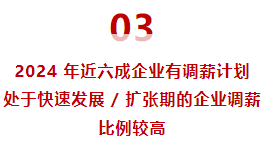
The research results show that 57% of companies have salary adjustment plans in 2024, a decrease of 9 percentage points compared to the previous year. With the fluctuation of the economic situation and the intensification of market competition, some enterprises may face greater operational pressure, so their expenditure on salary will be limited to a certain extent.
From the perspective of the development stage of enterprises, nearly 60% of enterprises in the period of rapid development/expansion in 2024 have salary adjustment plans, while only 33% of enterprises in the period of transformation and change plan salary adjustments. In the stage of rapid development, enterprises often need to provide more incentives to employees to maintain the stability and efficient operation of the team, while enterprises in the period of transformation and change will pay more attention to the rational allocation of resources and effective cost control, so there are relatively few plans for salary adjustments.
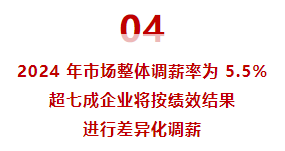
From the perspective of salary adjustment rate, the overall market salary adjustment rate has shown a fluctuating downward trend in the past 10 years, dropping to 5.5% to 6% in recent years. The latest research results show that the overall salary adjustment rate in the market in 2024 is 5.5%, the lowest in nearly 10 years. From the perspective of city types, the salary adjustment rate of various types of cities in 2024 has decreased compared to the previous year, with the highest salary adjustment rate in new first tier cities (5.7%). The difference in urban salary adjustment rates reflects the level of economic development and industrial structure of cities. With the adjustment and transformation of industrial structure, new first tier cities have attracted more and more high-tech industries and innovative enterprises. These industries and enterprises usually face greater talent competition pressure, so it is necessary to attract and retain outstanding talents by increasing salary levels. In recent years, the trend of differentiated salary adjustments in enterprises has become increasingly evident. More than 70% of companies with salary adjustment plans in 2024 will adjust salaries based on performance results, and salary adjustments for promoted personnel and core/backbone personnel are also common methods. The salary adjustment rate for promoted personnel and core/backbone personnel exceeds 10%, which is more than twice the general personnel adjustment rate. Differentiated salary adjustments reflect that companies focus on cost control and efficiency improvement, and tend to adopt precise incentives, with the aim of better controlling costs, improving efficiency, stimulating employee motivation, and promoting organizational performance improvement.
Source: May issue of Human Resources Services






